|
| ||||
Writing with the Left HandCorrect techniques for teaching left-handed children to write, draw and color-in with the left hand. 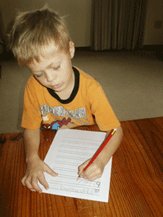
My son, Jon-Jon, who was 6 at the time of writing this, had been a little reluctant to write, even though he had learned all his letters and numbers. I wondered if his reluctance was a "boy-thing", a "maturity-thing" or whether his left-handedness was making writing difficult. I did a bit of research and what follows is what I learned. ~~~
It is usually around age 5 that children begin to clearly show dominance in one hand, although in some cases, it is apparent from a younger age. It is quite normal for children to use either hand in their toddler years and no attempt should be made to encourage the use of one hand over the other. If a child has a tendency to be left-handed, forcing her to use the right hand can do her more harm than good. Unless you are part of the 10% of the population that are left-handed, you are probably quite unaware of the differences between writing left-handed and right-handed and the difficulties that being left-handed presents. Experts say that by the primary grades, many left-handed child have not be correctly coached and have developed bad writing habits and experience considerable difficulty as a result. They often struggle and write extremely slowly, which is frustrating and puts them at a disadvantage if they have to write tests within a time limit. The problems they encounter can be easily overcome, with a bit of planning and the correct tools, such as left-handed scissors and seating a left-handed child on the left-side of a twin desk. Writing problems can be avoided by teaching a left-handed child a few simple habits as soon as she begins to put crayon to paper. The differences between writing with the left hand and the right handAs you know, in English and most western languages, we read and write from left to right. If you are right-handed, you begin on the left-side of a page and write, moving your hand from left to right. As you proceed you can see what you have written and your hand moves mostly in a pulling motion across the page. However, if you use your left hand (try this), as you write from left to right, your left hand tends to move over and cover the words that you have already written, so that you can't read them! If you are writing with ink that can smudge, this is an added problem. Your left hand moves across the page in a pushing motion. In order to be able to see more easily what they are writing, many left-handed children, raise their wrist towards the top of the page, into a hooked position, so that their hand does not cover their writing. This is NOT the best way for a left-hander to write.
Correct procedure for writing left-handed
To avoid this, a left-handed child needs to be coached from as early as possible, to differentiate between 'reading position' and left hand 'writing position' of the page/book. Even when colouring in or drawing, a preschool child that uses her left hand should be encouraged to become familiar with this rotated page-orientation. Reading position is straight up, the way we normally position a book when we read or write. Left hand writing position requires that the page be rotated clockwise to about 45 degrees (or less), so that the child can write across the page from left to right, seeing what she is writing without having to hook her wrist. The degree to which the paper should be rotated will depend on the height of the surface on which the child is writing, as this will affect the elbow position of the child. The amount of rotation needed increases as table height forces the elbows away from the body. In this rotated writing position the child must be taught to write or draw with a straight wrist and her elbow and wrist below the writing line, not lifted to the left side or with the wrist raised above the writing. When practicing this, the child should write large letters. Experience shows that virtually all left-handed children in kindergarten and primary grades have been coloring in with the page in reading position for years and have developed embedded habits for the orientation of images in reading position. As a result most of them have great difficulty writing and it requires considerable patience and coaching to undo these habits and build the child's confidence in the new technique. So, if you have a lefty, make sure you coach her correctly from the start, and if you know someone who has a left-handed child, share this information with them! P.S. I recently discovered a site that has printable letter formation charts specially for lefties as well as a host of other left-handed products, for both children and adults. This day is intended to raise awareness about left-handedness. Free Printable Preschool Worksheets This page lists all the printable worksheets and coloring pages on this site - alphabet pages, writing patterns, numbers, printable math activities, Bible memory verse cards and more! |
ABC Fun & 1-2-3
by Shirley Erwee Less than $1 per weekShirley's gentle, age-appropriate preschool programme gives you alphabet-based activities each week, alphabet crafts, alphabetized nursery rhymes, number and counting activities, as well as a list of recommended, quality children's stories to read aloud together as you and your children adventure through the alphabet, one letter per week. All the hard work and planning is done for you - for less than $1 per week, you just open up the book and start the A-B-C fun! Click here for more details: Famous Left-handersPrince William Marilyn Monroe Leonardo da Vinci Jimi Hendrix Martina Navratilova Nicole Kidman Ronald Reagan George H.W. Bush Bill Clinton Helen Keller Mark Twain HG Wells Michelangelo Raphael Tom Cruise Matt Dillon Goldie Hawn Michael Landon Julia Roberts Jimmy Connors John McEnroe Babe Ruth |
|||
|
[?] Subscribe To This Site
|
||||
|
Copyright © 2005-2020, Shirleys Preschool Activities.com All Rights Reserved. | ||||

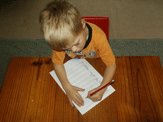
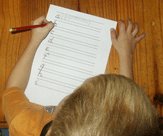
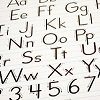


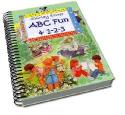





New! Comments
Have your say! Leave a comment in the box below.